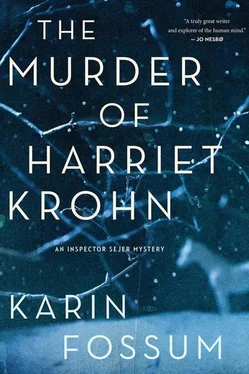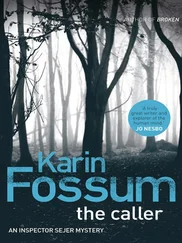Harriet Krohn walks around her living room.
Her thin ankles carry her body’s modest forty-nine kilos, and her calves arch like bowed sticks. The veins are right under her skin and look like knotted branches, despite her thick stockings. This is her last day on Earth, her last hour. She hears the ticking of the wall clock. The street outside is quiet. She sits down by the coffee table and eats a slice of bread, spread with liver pâté. She has dressed the open sandwich with beetroot; she’s fussy about what she eats. She has a cup of lightly sweetened tea with it. The fresh tang of the beetroot combines with the sweetness of the tea. Now she pauses. A grain of wholemeal from the bread has got stuck between two molars and is pressing like a wedge. She tries pushing one of her nails between the teeth to work it loose. It’s no good; the nail is too thick. She needs a toothpick, but she’ll finish eating first. Then she’ll tidy up. There’s nothing out of place in her home. Everything is cleared away at once. She chews long and thoroughly because it’s good for the digestion. When she’s finished, she carries her cup and plate out to the kitchen, brushes the crumbs into the sink, and rinses the cup. After that she fills a bowl with licorice allsorts and places it on the living room table. It’s mainly for decoration; she likes the colors.
It’s too early to go to bed. It’s only ten o’clock and she’s bored. She must pass the evening somehow, and television doesn’t interest her. She feels disgruntled. There’s nothing to look forward to, nothing happy on the horizon. Only old age and a steadily increasing debility. Soon she’ll be seventy-six, but she feels much older. She has plenty of family silver and a lot of money, but she hasn’t the strength to use it — either on herself or others. She makes up her mind to write a letter. She has a nephew in Germany with whom she keeps in touch. Writing a letter is pleasant, and she can use it to fill the remaining hour. She always goes to bed at eleven. She has an antique writing desk in the living room with a leaf that opens out, giving her a nice little workspace. She glances out of the window and sees the heavy sleet. It’s warm in the living room, because she has the heaters on full. Even though she’s a tiny woman, she moves around with great effort. She was only thirteen when she was diagnosed with arthritis. Throughout her life, she’s battled to keep the disease at bay. But this is one of her better days: the pains can be much worse than they are this evening, November 7. There are days when she just lies in bed moaning. Cursing her own fate, which is so much worse than other people’s. The bitterness makes her hot, so she must get it out and down on paper.
She switches on the lamp next to the desk, and it warms her left cheek. She can’t see the man coming down the street. She’s found a blank sheet of paper. She gets out her glasses and perches them on her nose, holds the pen over the paper. It’s an almost spiritual moment for Harriet Asta Krohn. The pristine white paper, all the things she wants to say. The pen won’t stay still between her fingers, which are shaking with effort. But she knows from experience that as soon as it touches the paper, it will steady. Then she’ll be in command of her muscles and manage to write in a fairly decent hand with thin, delicate loops. However, she knows, too, that when she reaches the end her fingers will begin to tremble again, as the pain takes over. The grandfather clock ticks, Harriet’s heart beats. And while it does, the blood circulates through her frail body. She’s warm, replete. Then she feels the grain of wholemeal again, pressing. She’d forgotten her intention of finding a toothpick, but now she’ll leave it. She thinks: I can do that later.
Charlo stands at the bottom of the steps that lead to the front door.
No one saw him go through the gate. Harriet is unaware of his proximity, even though he’s only a few meters away. She’s always lived alone, and much of her life has been spent in this house. She knows all its sounds: every creak of the old timber, the lilac that beats against the panes of the living room when the wind blows in the summer. The occasional mouse scurrying across the attic floor. The house is spartan. The rooms are small and hot. The furniture is simple and carefully chosen; its colors and patterns blend together. There is little decoration, because she doesn’t waste money. She has no time for empty display.
Charlo climbs the steps. Harriet draws a deep breath and puts her pen to the paper, writing “Dear.” A gold bracelet on her wrist rattles on the writing surface. The letter gradually takes shape inside her head; she can hear her own voice within her. It’s authoritative and flows lightly and easily, but her hand is much slower. In the midst of this tranquil interlude, she’s disturbed by the doorbell. A sudden, insistent note in the silence. She raises her head and listens in surprise, automatically glancing at the clock on the wall, as if the clock can tell her who’s coming. Five past ten. It’s well past the time for salesmen, and too late for her friend Mosse next door. She’d never call at ten in the evening. Unless it was something very out of the ordinary. Could that be it? Could something have happened? But then if it were Mosse, Harriet realizes, she’d have phoned first, because she’s considerate, and both of them are elderly. But the doorbell has rung and she sits in her chair with her pen in her hand, paralyzed. She stares at the single word “Dear.” Then she thinks, at least the door chain’s on. But there’s silence now and she’s perplexed. After all, it could just be children playing, excited by the sleet and running around the streets in search of mischief. To leave her chair and walk through the living room and all the way out to the hall would be an effort for her; she won’t get up unless she has to. But the bell rings again, twice. The person at the door isn’t going to give up. It’s silly not to answer, she realizes. She is a grownup after all. Perhaps it’s someone from the Women’s Institute; they’ve got a habit of calling incessantly.
She rises now, with difficulty, and walks with short, fumbling steps across the room. Again she feels the wholemeal grain wedged in her teeth. Now she’s in the hall. Through the glass in the door, she can make out a figure standing on the top step. A solid black shadow. Again she hesitates. Who would turn up at this hour? She knows hardly anyone. First she undoes the lock, and then she opens the door warily as far as the chain permits. There’s a man in a green parka. He moves slightly so she can see him through the chink. Isn’t there something familiar about him? She racks her brain but can’t find him in the myriad faces stored there. He’s holding a parcel up to his chest. She has no idea what it is. She stands staring at him through the crack as she waits for some explanation. Without realizing it, her thin face has assumed a hostile and suspicious expression.
“Harriet Krohn?” the man asks.
The voice is friendly and light, as if the white snowflakes have made him merry, with their sudden Christmassy atmosphere at the beginning of November.
“Yes?” she says, and stares at the package, the little she can see of it through the gap between the door and the frame. How big it is, how infinitely white.
“I’ve got a flower delivery,” he says, beaming. Harriet is confused. Her birthday isn’t for another month, and even when it comes, no one will send flowers.
“There must be a mistake,” she stammers, still mystified. Has she ever been sent flowers before? Not that she can remember. That’s suspicious in itself. But the flowers seem to whisper to her from within their white paper. Just imagine, flowers. Can it be? Has she forgotten something? Mentally she ransacks the previous day, but comes up with nothing. The man waits patiently on the steps. It’s snowing on his shoulders. The light above the door reveals the wet patches.
Читать дальше












